|
Editor's note: This story was originally published on March 25. IT COULD HAVE BEEN one of the greatest endings to any World Series in history. It could have been the worst ending to any World Series in history. Or, as San Francisco Giants catcher Buster Posey said, shaking his head in disbelief, "It could have been the weirdest ending." The second-to-last play of the 2014 World Series had so many moving parts, so many storylines, elements and ironies, all wrapped up in a frantic, 12-second run from home to third base by the Kansas City Royals' Alex Gordon with two outs in the bottom of the ninth inning of a one-run game, the seventh of the World Series. On the mound was the virtually unhittable Madison Bumgarner, who was one out away from completing perhaps the greatest postseason performance ever by any pitcher. Behind the plate was Posey, who in a different way is also unhittable after he, through no fault of his own, helped create a new rule in 2014 regarding collisions at the plate. On deck was the Royals' Salvador Perez, who had homered off Bumgarner in Game 1, the only run the Giants pitcher allowed in 21 innings of the World Series. At shortstop was Brandon Crawford, whose strong, accurate throwing arm is known well by every third-base coach in the National League. And at stake was the Royals' first world championship in 30 years and the Giants' run at destiny. 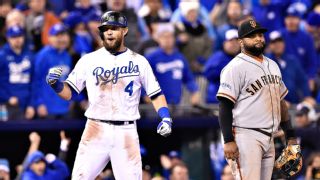 Of the 14 Game 7s in the World Series that were decided by one run, the only one that ended with an out being made on the bases was in 1926, when Babe Ruth inexplicably tried to steal second base -- and was thrown out -- with two outs in the ninth inning with no one else on base against the Cardinals. But in 2014, there was, at least for a while, a chance that the World Series would be decided on a play at the plate. A bang-bang play, out or safe, would have been a finish for all ages. But if Gordon had been out at the plate by 25 feet and just surrendered to Posey 10 feet up the third-base line, it would have been the worst World Series ending ever. And Royals third-base coach Mike Jirschele would say four months later, "I wouldn't be wearing this uniform right now." If the play had ended in a home plate collision between Gordon and Posey, invoking a rule that no one can explain a year after its confusing implementation, they'd still be talking about that play in the year 3015, especially if instant replay had been used to decide the outcome. "When I went home [to Omaha, Nebraska] after the season, it was the first question that I was asked by everyone I met: 'Do you think you could have scored?'" Gordon said. "After a while, I stopped them before they even finished the question, and said, 'No, I couldn't have.'" Yet all spring, in Royals camp and in Giants camp, it remained a great debate. The questions were still being asked. What odds were better, Gordon being sent home and scoring on that play, or the masterful Bumgarner giving up a two-out hit to Perez? What if Gordon had run harder to first base -- could he have scored? What if Gordon hadn't stumbled rounding second base? A high school baseball team in Kansas City replicated that play 10 times one day in practice in the offseason, "and nine times, they got the runner at the plate," said Gordon. "And that's a high school team, not the San Francisco Giants." So let's examine that wonderfully bizarre play, step by step, from the perspective and the vantage point of the 10 men in uniform who had a hand, directly or tangentially, in the play. 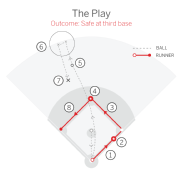 [1] Gordon to 1B, 4.7 seconds. [2] Where Gordon is when ball lands. [3] Gordon to 2B, 8.3. [4] Where Gordon is when Perez kicks the ball. [5] Where ball lands, 2.98. [6] Perez kicks ball along fence. [7] Play ends when Crawford catches relay, 11.78. [8] Gordon to 3B, 12.16.
The hitGordon hits a sinking line drive to left-center field off Bumgarner. Giants manager Bruce Bochy: "As soon as it was hit, I thought, 'The game is over, we just won the World Series.'" Gordon: "As soon as it went up, I thought it was a hit. I'm a left fielder. I know the situation. They are playing me deep with two outs. I saw the outfielders, and I thought it was going to split them for a double. I ran hard out of the box, but then, as I was running, I had to find first base, and try to see the ball to see if it was possible that I could get to second." 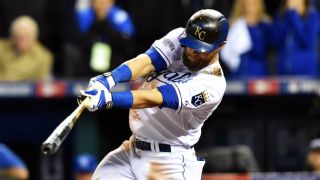 Jirschele: "I don't know. I don't know [if Gordon was running hard out of the box]. He was not going his fastest, but even if he had been, I still don't know if he would have scored." Jirschele: "I don't know. I don't know [if Gordon was running hard out of the box]. He was not going his fastest, but even if he had been, I still don't know if he would have scored."
Giants center fielder Gregor Blanco: "The first thing that came to my mind was, 'Go get it; don't let it drop. Whatever you do, don't let it drop.' But right after it passed Crawford, I knew I couldn't catch it. Then I thought, 'Don't let it get by you.'" Posey: "I thought there was a good chance that he [Blanco] was going to catch it, but then I saw him letting up. At that point, I was halfway between the plate and Bumgarner [ready to embrace]." Giants left fielder Juan Perez: "As soon as it was hit, I said, 'Game over. We won it all. Blanco has got this.' So, I was running toward the infield instead of backing up on the play."
The errorThe ball landed just to Blanco's right, then shot past him. Juan Perez: "I got probably five steps toward the infield when I saw the ball, and he didn't have it. I realized my mistake, and I sprinted after the ball. That's as hard as I have ever sprinted in my life. As I was running after the ball, I was thinking, 'Oh, my God, this can't be happening now ... not now.'" Blanco: "When the ball hit the ground, the ground was hard and the grass was wet. The ball kind of squirted out real fast. I couldn't believe Perez was there. He did a great job to get to the ball so quickly." Bochy: When it shot past Blanco, and I'm thinking, 'Oh (----), he's going to get in scoring position." Gordon: "I saw the ball hit the grass, and all of a sudden, I saw Blanco with his back turned to me. But with the video boards in Kansas City, in the outfield, it's hard to see where the ball is, to see what the ball is doing, to see what is going on out there. So I just ran as hard as I could." 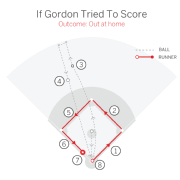 [1] Gordon to 1B, 4.7 seconds. [2] Gordon to 2B, 8.3. [3] Where ball lands, 2.98. [4] Ball from Crawford's glove to Posey's glove, 2.6 (estimated). [5] Gordon to 3B, 11.9 (est.). [6] Gordon reaches HP, 15.5 (est.). [7] Gordon is 28 feet (est.) from home plate when ball arrives. [8] Total time from contact to ball in Posey's glove, 14.38 (estimated).
The kickThen Perez kicked the ball down the warning track, and Gordon kept running. Juan Perez: "When I got to the ball, I tried to pick it up with my bare hand instead of using my glove. That was another mistake. Then I kind of kicked the ball and I thought, 'Oh my God, he might score!' I wasn't sure how fast he really was, and I thought there was a chance he would score." Jirschele: "I know Gordo is going to get to third, and I'm thinking, 'Holy mackerel, we might have a shot here.'" Blanco: "But when he misplayed it, I thought, 'Oh my God, he's going to score!' All I could think was, 'Oh my God, throw it back in, please!!!'"
Bochy: "When Perez had some trouble with it, and I'm thinking, 'Just get it back in [the infield]. Just get it back in.'" Posey: "When we kicked it around a little, I thought, 'I had better get back behind the plate because there might be a play at the plate.'" Crawford: "When I saw Perez not picking up the ball, that's when I had my, 'Oh (----) moment.' I thought, 'Are we really going to have a play at the plate with two outs in the bottom of the ninth in the seventh game of the World Series?'" Gordon: "When I hit second base, I hit it so hard, I almost hit it too hard, and I almost fell down. That would have been embarrassing to fall down and make the final out of the World Series. I'm kind of glad they kicked the ball around a little. But I never saw Perez kick the ball. Again, with the video board, there is a glare that doesn't allow you to see the ball." Crawford: "All I could think of then was, 'Get the ball in as fast as you can.' I didn't care if it was a little over my head and I had to jump for it, or if I had to catch it on one hop. Nothing against [Joe] Panik, who was the second cutoff man on the play, but I was going to catch the ball unless I couldn't catch it." Juan Perez: "After I kicked the ball the first time, then I took my time. I picked up the ball. All I could think of was to get the ball to Crawford. He has a good arm. He will do the rest." 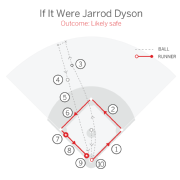 [1] Dyson to 1B, 4.7 seconds. [2] Dyson to 2B, 8.02. [3] Where ball lands, 2.98. [4] Crawford catches throw from Perez, 11.78. [5] Ball from Crawford's glove to Posey's glove, 2.6 (estimated). [6] Dyson to 3B, 11.27. (est.). [7] Where Dyson should be when Crawford catches throw, 14.1 feet past 3B. [8] Dyson reaches HP, 14.52 (est.). [9] Dyson is 3.9 feet (est.) from HP when ball arrives. [10] Total time from contact to ball in Posey's glove, 14.38 (est.).
The throwThe throw from Perez short-hopped Crawford, but he picked it. Now the ball was in the shortstop's hands. And Gordon was just getting to third base. Jirschele quickly put up the stop sign. Jirschele: "When Alex got to third, he looked at me and asked, 'Could I have scored?' I said, 'No way.' And he said, 'OK. OK.'" Gordon: "Once I got to third, the situation creeps into your head. The first thing I asked Jirsch was, 'Could I have scored?' There was no better person to ask than the guy that watched the whole play." Crawford: "I saw that the throw [from Perez] was low, and I picked it, but I don't even remember picking it. After the game, guys said, 'Nice pick.' I don't even remember picking that ball. When I did catch the ball, I looked at third. Gordon was just stepping on the bag. The third-base coach had his hands up. I was about 30 or 40 feet out on the outfield grass. I never felt that they were going to send him home. I have thrown guys out at home from much deeper than where I was, and they were much closer to home. There was no doubt in my mind that I was going to make the throw to Buster. I was much more panicked when the ball was bouncing around in the outfield. Once it got in my hands, I wasn't worried anymore because the ball was in my hands. I didn't have to depend on anyone else. If they had sent him home, I think he would have been out by a lot." Jirschele: "I am just watching to see whether Crawford secures the ball. If he does, there is no way I could send him. If it short-hops him and bounces away, I can keep Alex going. But Crawford has an above-average arm and is an accurate thrower. There was no way I was going to let the World Series end with our runner out at home plate by 20 feet." Royals manager Ned Yost: "He would not have been out by 20 feet. He would have been out by 40 feet." Gordon: "I never thought I was going to score, but I can't tell you exactly what was going on in my head as I was running to third. No one goes to the plate and says -- even though there was an error on the play -- let's get an inside-the-park homer here. With everything that was going on, I was just running as hard as I could. I know that Crawford made a great pick; he has a great arm. It's up for debate about that, but the smart play was to hold me." 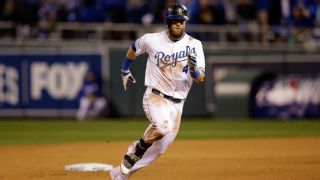 Salvador Perez: "When I saw Crawford catch the ball with Alex just having gotten to third, I said to myself, 'Stop!!!' With Crawford's arm, he would have been out easy at the plate. I think he would have been out by 25 feet. If they had sent him, and he was out, the questions would have been, 'Why did you send him? Why not give Salvy a chance?' There would have been a lot more questions if he'd sent him. It was right thing to hold him." Salvador Perez: "When I saw Crawford catch the ball with Alex just having gotten to third, I said to myself, 'Stop!!!' With Crawford's arm, he would have been out easy at the plate. I think he would have been out by 25 feet. If they had sent him, and he was out, the questions would have been, 'Why did you send him? Why not give Salvy a chance?' There would have been a lot more questions if he'd sent him. It was right thing to hold him."
Jirschele: "Alex had just hit third base when Crawford caught the ball. Look at it another way: From where he was standing, if that had been a popup, could he have tagged up and scored? No. There was no way I could send him. Even if that was [Royals outfielder Jarrod] Dyson [one of the game's fastest runners] rounding third, I would have held him on that play." Yost: "It's a nonissue. It's a zero issue. What are people looking at? I equate it to Escie [Royals shortstop Alcides Escobar]. He is the best relay man in our league. Whenever there is a relay play, I am screaming to the other team, 'Send him! Send him,' because I know Escie is going to throw his butt out every time. Crawford is as good in the NL as Escie is in the AL on that play. Not one cell in my body thought about sending him in that situation. Plus, we had Salvy on deck. He is a clutch hitter." Blanco: "Perez did a great job getting the ball to Crawford. Everyone knows what a great arm Crawford has. They did the right thing not sending him home. He would have been out." Bumgarner: "I still never thought he might score on that play. They did the right thing holding him. If they hadn't, our chances were real good that we'd throw him out at the plate. If they had sent him, it would have blown up. It would have blown up terribly. It was the right call to not send him." Bochy: "I never thought that they would send him home. It never crossed my mind that they would send him. That was an option, but not a good option. The better option was to hold him." Yost: "Dayton [Moore, the Royals' general manager] said it best when he said of those who thought they should send him: 'Do you know who our third-base coach is? If he had sent him, everyone would know his name.' It would have been the dumbest thing that he had done during the course of the year." Posey: "I had to get ready for a play at the plate. But if they had sent him, he would have been out ... by a lot." Juan Perez: "When I got the ball to Crawford, [Gordon] was just getting to third base. I knew then that we would get him at the plate if he went home. He would have been out for sure if he had gone home. The third-base coach did the right thing. You don't want the World Series to end with everyone blaming the third-base coach." Jirschele: "If I had sent Gordo, he would have had to get in a rundown." Crawford: "Or he would have tried to run the catcher over, which you're not allowed to do anymore." Yost: "With Crawford's arm and accuracy, it would have been suicide. It would have been a surrender at the plate. That would have been the worst end of a World Series ever, a guy out by 40 feet at the plate." Jirschele: "When you get a guy thrown out at home, you get upset, you feel like it's your fault. When you send a guy home, sometimes you know you are taking a chance, but you take that chance. I took a chance earlier in the game. I sent [slow-footed] Billy Butler home from first on a double with no one out. He made it. But this was no time to take a chance." 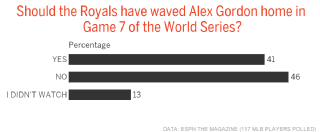 The opportunityYet given the brilliance of Bumgarner, wasn't taking that chance the Royals' only hope? Yost: "No. I couldn't believe Bumgarner was still in the game. He'd thrown [117] pitches [three] days earlier, and there he is, in his fifth inning of relief. It was a miracle that he was still in there. I thought, 'We are going to get this guy.'" Jirschele: "No, I didn't factor [Bumgarner] in. I was just reading the play. You have to ask yourself, 'Who is on deck?' I knew Salvy was on deck. I knew what he had done against Bumgarner in the Series." Gordon: "You can't think who is on the mound in that situation. But I was one of the few that got a hit off a god of a pitcher in the postseason."
Crawford: "I'm sure that [Bumgarner] is the only reason why some people would even suggest sending him home in that situation. He was so dominant in the World Series, and in the whole postseason. Most people didn't think they could score off him. But they had a good hitter on deck with Perez. People forget about that. Hindsight is 20-20. If they had sent him, and he'd been out by 30 feet, it would have been a terrible call. But since Perez didn't get a hit, and we won the World Series, it was a bad call. But it wasn't. It was the right call. The only way it could have been a good call would be if I made a bad throw, or Buster would have missed it. And ..." Crawford didn't finish his sentence, but strongly hinted that neither of those would have happened. Yet the irony is inescapable that Posey might have been involved in a collision at the plate, given that him being steamrolled at home plate by the Marlins' Scott Cousins in 2011 was the impetus for Major League Baseball changing the rule on home plate collisions. "I joke around that with the controversy about collisions at the plate this year, what if that had happened in the final inning of the final game of the season?" Gordon said. "I'm not saying I would have run Buster over, but it would have been a great way to end the season if there had been a collision, and they had to enforce the collision rule there. Or, if they had to go to replay on a bang-bang play at the plate. It would have taken five minutes to hash that out. The anxiety in the ballpark at that time would have been out of control."
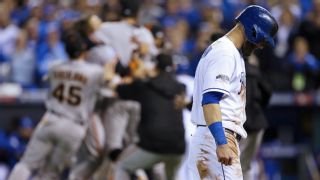 The questionsAlas, it never got to that. But the questions were still being asked four months later. "I didn't think anything of that play until after the game," Jirschele said. "I was in the coaches' room, and no one was talking about it. About 15 minutes after the game was over, I went out to say goodbye to some of the fellas, and one of the reporters asked me about that play. I didn't even think twice about it. The answer was 'No.' Then another half-dozen reporters wanted to talk to me about it. That's more reporters than have ever talked to me." And all spring training, reporters wanted to talk to him -- and to Gordon. "When I saw Jirsh first thing this spring, the first thing I asked him was, 'How many times were you asked this offseason about the play?'" Gordon said. "He understood what I was talking about. He told me if he had sent me and I'd been out by 30 feet, he wouldn't be wearing the uniform now." You mean fired? "No, but I probably would have been reassigned," Jirschele said. "It wouldn't have been a great ending for me. I would have felt terrible. I would have lost sleep over that one. I would have been very upset if I would have sent him, and he would have been out by 30 feet." Juan Perez said he has watched the play many times since that night. "My mom and dad were watching it live at home; my friends taped the play," he said. "Watching the video, I can scream, 'Oh my God, dive for the ball.' I can laugh about it now." Bochy wasn't laughing, and didn't buy that Gordon being out by 30 feet at the plate would have been a bad way to win the World Series. "I don't think there's a bad way to win the World Series, but it would have been a controversial way," he said. "It would have been a much more controversial way if they had sent him because he would have been out by a mile." Gordon said he knows he will be asked about that play for the rest of the career, but said, "That's a good problem to have. I wouldn't view it as a negative. It was a really fun play to be a part of."
|

